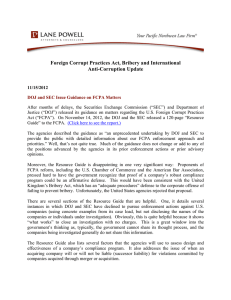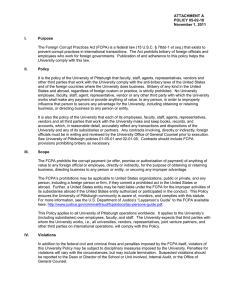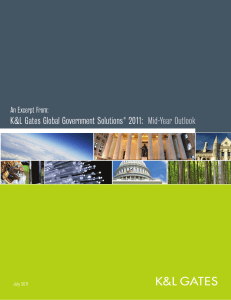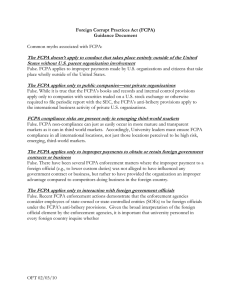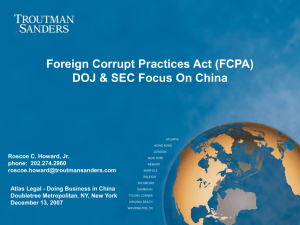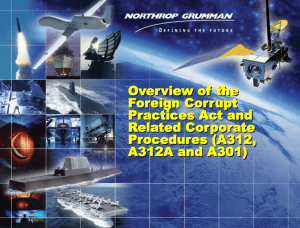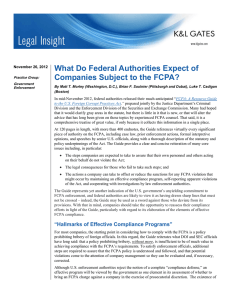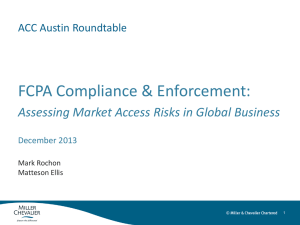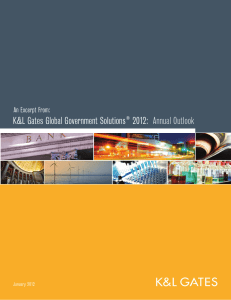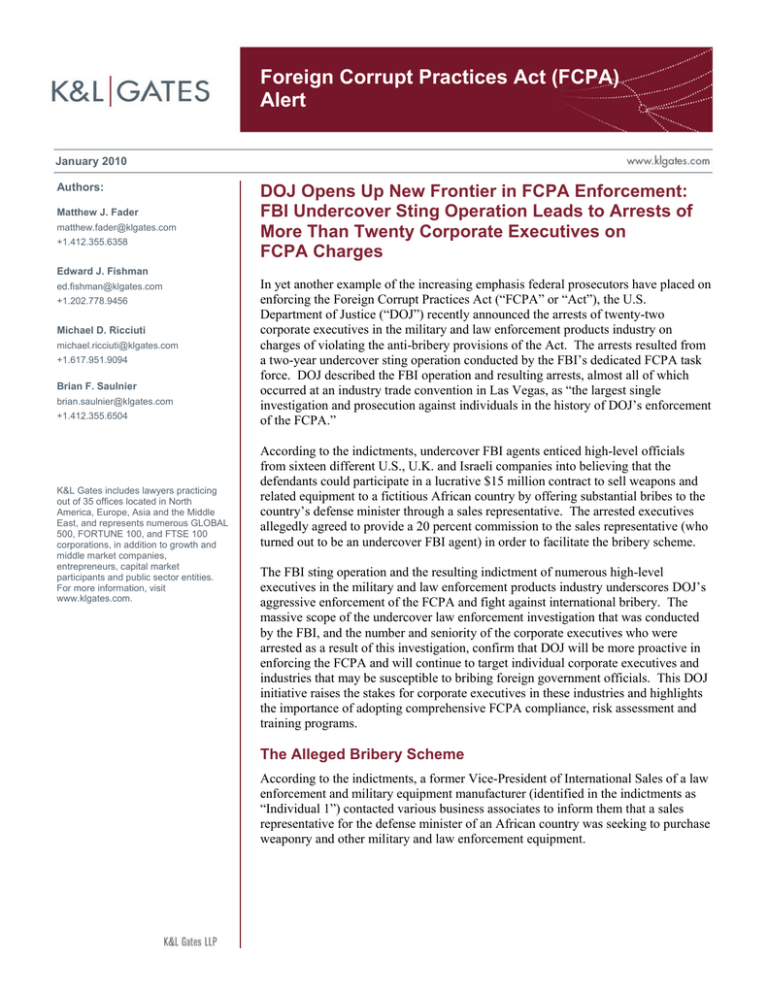
Foreign Corrupt Practices Act (FCPA)
Alert
January 2010
Authors:
Matthew J. Fader
matthew.fader@klgates.com
+1.412.355.6358
DOJ Opens Up New Frontier in FCPA Enforcement:
FBI Undercover Sting Operation Leads to Arrests of
More Than Twenty Corporate Executives on
FCPA Charges
Edward J. Fishman
ed.fishman@klgates.com
+1.202.778.9456
Michael D. Ricciuti
michael.ricciuti@klgates.com
+1.617.951.9094
Brian F. Saulnier
brian.saulnier@klgates.com
+1.412.355.6504
K&L Gates includes lawyers practicing
out of 35 offices located in North
America, Europe, Asia and the Middle
East, and represents numerous GLOBAL
500, FORTUNE 100, and FTSE 100
corporations, in addition to growth and
middle market companies,
entrepreneurs, capital market
participants and public sector entities.
For more information, visit
www.klgates.com.
In yet another example of the increasing emphasis federal prosecutors have placed on
enforcing the Foreign Corrupt Practices Act (“FCPA” or “Act”), the U.S.
Department of Justice (“DOJ”) recently announced the arrests of twenty-two
corporate executives in the military and law enforcement products industry on
charges of violating the anti-bribery provisions of the Act. The arrests resulted from
a two-year undercover sting operation conducted by the FBI’s dedicated FCPA task
force. DOJ described the FBI operation and resulting arrests, almost all of which
occurred at an industry trade convention in Las Vegas, as “the largest single
investigation and prosecution against individuals in the history of DOJ’s enforcement
of the FCPA.”
According to the indictments, undercover FBI agents enticed high-level officials
from sixteen different U.S., U.K. and Israeli companies into believing that the
defendants could participate in a lucrative $15 million contract to sell weapons and
related equipment to a fictitious African country by offering substantial bribes to the
country’s defense minister through a sales representative. The arrested executives
allegedly agreed to provide a 20 percent commission to the sales representative (who
turned out to be an undercover FBI agent) in order to facilitate the bribery scheme.
The FBI sting operation and the resulting indictment of numerous high-level
executives in the military and law enforcement products industry underscores DOJ’s
aggressive enforcement of the FCPA and fight against international bribery. The
massive scope of the undercover law enforcement investigation that was conducted
by the FBI, and the number and seniority of the corporate executives who were
arrested as a result of this investigation, confirm that DOJ will be more proactive in
enforcing the FCPA and will continue to target individual corporate executives and
industries that may be susceptible to bribing foreign government officials. This DOJ
initiative raises the stakes for corporate executives in these industries and highlights
the importance of adopting comprehensive FCPA compliance, risk assessment and
training programs.
The Alleged Bribery Scheme
According to the indictments, a former Vice-President of International Sales of a law
enforcement and military equipment manufacturer (identified in the indictments as
“Individual 1”) contacted various business associates to inform them that a sales
representative for the defense minister of an African country was seeking to purchase
weaponry and other military and law enforcement equipment.
Foreign Corrupt Practices Act (FCPA) Alert
The sales representative was actually an undercover
FBI agent. Some of the associates that “Individual
1” contacted agreed to meet with the “sales
representative” to determine the terms of sale.
During these meetings, many of which occurred at
the Ritz-Carlton Hotel in Washington, D.C., the
defendants allegedly agreed to add a bogus 20
percent commission to the sales contracts, which
would be used to provide a 10 percent kickback to
the defense minister, a 5 percent kickback to the
“sales representative,” and a 5 percent kickback to
“Individual 1.” The “sales representative” then
arranged a “test” deal to allow the defense minister
to see the products and receive a kickback. The
defendants who allegedly agreed to the commission
arrangement mailed two purchase orders to the sales
representative, one representing the true cost of the
goods and another representing the cost of the goods
plus the hidden 20 percent commission. In fifteen of
the sixteen indictments filed as a result of the
investigation, the defendants allegedly made the 20
percent commission payment to the undercover
agent posing as the sales representative in
connection with the “test” deals.
FBI Involvement
The scope of the FBI investigation in this FCPA
enforcement matter is unprecedented. Over an
approximately two-year period, the FBI used over
150 agents to execute at least fourteen search
warrants in Florida, California and Virginia. The
twenty-two defendants arrested in the sting
operation hailed from three countries and five U.S.
states. In addition to the FBI operation, the City of
London police executed an additional seven search
warrants in the United Kingdom as part of its own
investigation. This action follows recent statements
by DOJ indicating that the FBI had recently become
more involved in DOJ’s FCPA enforcement efforts
and that DOJ has instructed the FBI to use more
aggressive investigation tactics to uncover FCPA
violations. These indictments confirm the validity
of these statements. After the indictments were
unsealed, Lanny Breuer, Assistant Attorney General
of DOJ’s Criminal Division, stated that the “fight to
erase foreign bribery from the corporate playbook
will not be won overnight, but these actions are a
turning point. From now on, would be FCPA
violators should stop and ponder whether the person
they are trying to bribe might really be a federal
agent.”
The Indictments
Each individual was charged with at least one count
of conspiracy to violate the FCPA, one count of
conspiracy to commit money laundering, and one
count of violating the FCPA’s anti-bribery
provisions. Each count of conspiracy to violate the
FCPA carries a five-year maximum prison sentence,
each substantive FCPA count carries a five-year
maximum sentence, and each conspiracy to commit
money-laundering count carries a twenty-year
maximum sentence. Thus, each defendant faces a
maximum possible prison sentence of thirty years
and in some cases up to fifty years. Moreover, DOJ
continues to take a broad view of conduct that will
satisfy the Act’s interstate commerce requirements.
To violate the substantive provisions of the FCPA,
an individual attempting to bribe a foreign
government official must make use of the mails or
some other means or instrumentality of interstate
commerce to further that bribe. While the mails are
specifically listed in the indictments, thirty-one of
the sixty substantive FCPA counts identified in the
indictments were based on merely traveling across a
state line for meetings with an undercover FBI
agent.
Impact on Corporate Executives
DOJ has affirmed that it intends to prosecute
individual violators of the FCPA to the fullest
extent allowed by law. These indictments of
twenty-two individuals concluded a year in which
the DOJ tried four individuals for FCPA violations,
the most active year in its FCPA enforcement
history. Considering that juries returned four guilty
verdicts on the FCPA-related charges (conspiracy to
violate or substantive violations of the FCPA), DOJ
is unlikely to hesitate about continuing to take
individual violators of the FCPA to trial. The DOJ
also has not shown leniency to the individuals who
do proceed to trial, seeking sentences at or above
the upper limit of the discretionary sentencing
guidelines in each case. The recent FBI sting
operation signifies that DOJ will likely use its most
aggressive investigative and enforcement tactics to
deter individual violations of the anti-corruption
laws.
January 2010
2
Foreign Corrupt Practices Act (FCPA) Alert
Impact on Business Entities
While the indictments currently name only
individuals, business entities must be aware that the
DOJ and the U.S. Securities and Exchange
Commission (“SEC”) often initiate enforcement
actions against companies that fail to prevent or
detect FCPA violations by their executives,
employees and other representatives or are otherwise
responsible for the wrongdoing. For instance, in a
recent FCPA action, the SEC charged both Nature’s
Sunshine Products and two of its high-level
executives for failing to uncover “red flags” in
accounting records that indicated employees of its
Brazilian subsidiary were paying bribes to Brazilian
officials. The “control person liability” theory
asserted by the SEC in that enforcement action
would, in certain circumstances, make senior
managers responsible for the activities of
subordinates even if they had no actual knowledge
of those activities. With DOJ stepping up its FCPA
enforcement with dedicated and aggressive
assistance from the FBI, business entities should
review their FCPA compliance, risk assessment and
training programs to ensure that their employees,
agents, and other representatives are not placing the
business organization at risk from an FCPA
compliance standpoint. If a company authorizes a
transaction without diligently investigating a known
“red flag” and an unlawful payment is made, the
company could expose itself and its officers,
directors and employees to significant FCPA
liability.
The Lessons Learned from the FBI
Undercover Sting
•
Corporate directors, officers and employees
have been put on notice that DOJ’s commitment
to making the prosecution of individuals under
the FCPA a priority is real. Along with their
companies, individuals will be held accountable
for failure to comply with or conspiracy to
violate the FCPA.
•
In addition to FCPA violations coming to the
attention of DOJ as a result of whistleblowing
and self-reporting, the FBI is going to take a
proactive approach, employing traditional
undercover law enforcement techniques to
identify conduct that violates the FCPA and
DOJ will continue to employ a strategy of
industry-wide investigations.
•
The scope of international cooperation in
combating corruption is expanding beyond just
the sharing of information. It now clearly
includes coordination of the efforts of law
enforcement officers across borders.
•
Citizens of countries other than the United
States must be wary of engaging in conduct that
may violate the FCPA while in the territory of
the United States. DOJ will not hesitate to
apply the FCPA to non-U.S. citizens
committing overt acts in furtherance of a
conspiracy to violate the Act if they can find
any jurisdictional basis for doing so.
Further, this action highlights the need for
companies to:
•
Implement a comprehensive FCPA compliance
and due diligence program, as corporate
liability frequently depends on the extent to
which companies have adopted procedures and
policies to prevent unlawful conduct by their
executives, employees, and third party business
partners;
•
Reaffirm the importance of effective anticorruption policies and controls through
training for all executives, employees, and
agents involved in all business interactions with
foreign government officials; and
•
Ensure that management understands the
importance of an effective compliance program
and the necessity that corporate representatives
immediately report any “red flags” or
suspicious behavior to the legal or compliance
department for further investigation.
January 2010
3
Foreign Corrupt Practices Act (FCPA) Alert
K&L Gates FCPA Experience
With approximately 1,800 lawyers in 35 cities on
three continents, K&L Gates has the breadth and
depth of experience necessary to handle the variety
of complex legal issues that arise under the FCPA
and similar anti-corruption laws around the world.
Our lawyers frequently deal with FCPA issues
associated with international business transactions,
conduct global corporate investigations into
possible FCPA violations, help organizations
develop effective FCPA compliance programs,
conduct FCPA compliance training programs
domestically and abroad, and represent clients in
FCPA enforcement proceedings.
Anchorage Austin Beijing Berlin Boston Charlotte Chicago Dallas Dubai Fort Worth Frankfurt Harrisburg Hong Kong London
Los Angeles Miami Moscow Newark New York Orange County Palo Alto Paris Pittsburgh Portland Raleigh Research Triangle Park
San Diego San Francisco Seattle Shanghai Singapore Spokane/Coeur d’Alene Taipei Tokyo Washington, D.C.
K&L Gates includes lawyers practicing out of 35 offices located in North America, Europe, Asia and the Middle East, and represents numerous
GLOBAL 500, FORTUNE 100, and FTSE 100 corporations, in addition to growth and middle market companies, entrepreneurs, capital market
participants and public sector entities. For more information, visit www.klgates.com.
K&L Gates is comprised of multiple affiliated entities: a limited liability partnership with the full name K&L Gates LLP qualified in Delaware and
maintaining offices throughout the United States, in Berlin and Frankfurt, Germany, in Beijing (K&L Gates LLP Beijing Representative Office), in
Dubai, U.A.E., in Shanghai (K&L Gates LLP Shanghai Representative Office), in Tokyo, and in Singapore; a limited liability partnership (also named
K&L Gates LLP) incorporated in England and maintaining offices in London and Paris; a Taiwan general partnership (K&L Gates) maintaining an
office in Taipei; a Hong Kong general partnership (K&L Gates, Solicitors) maintaining an office in Hong Kong; and a Delaware limited liability
company (K&L Gates Holdings, LLC) maintaining an office in Moscow. K&L Gates maintains appropriate registrations in the jurisdictions in which its
offices are located. A list of the partners or members in each entity is available for inspection at any K&L Gates office.
This publication is for informational purposes and does not contain or convey legal advice. The information herein should not be used or relied upon
in regard to any particular facts or circumstances without first consulting a lawyer.
©2010 K&L Gates LLP. All Rights Reserved.
January 2010
4

